By Eric House
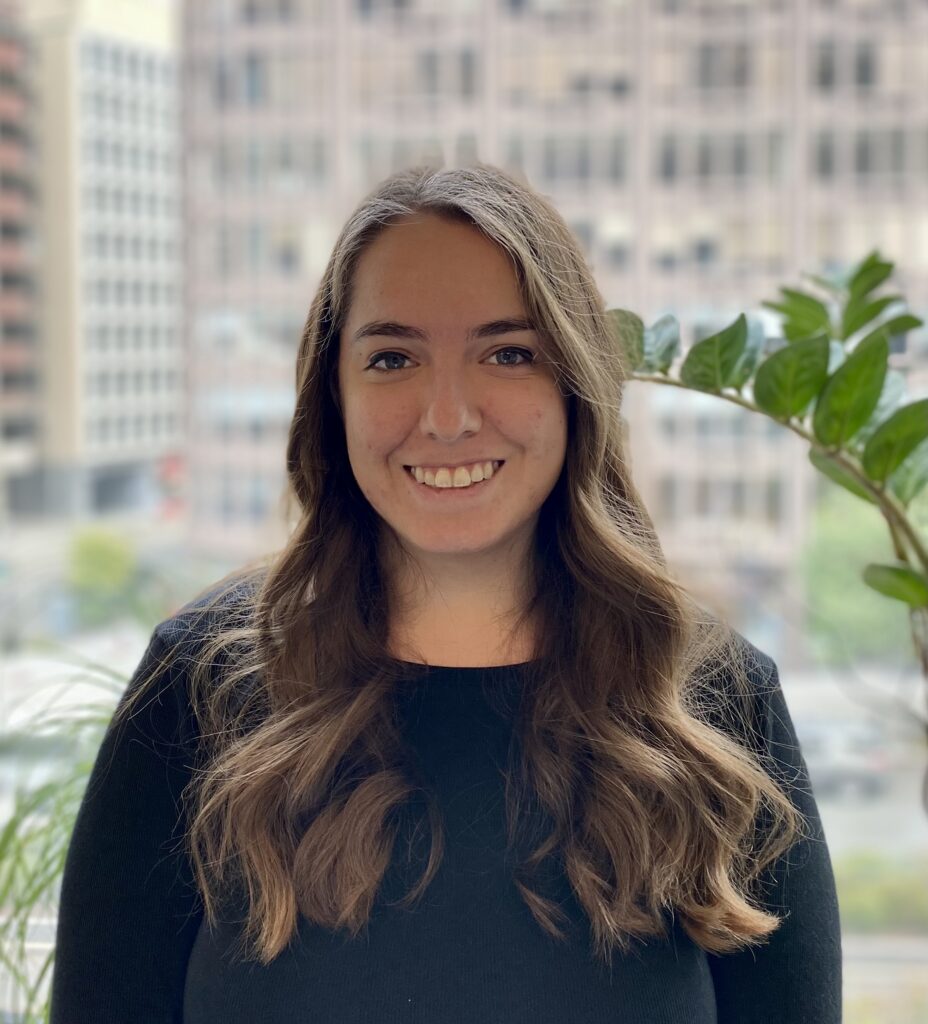
Neither a global pandemic nor an Ebola outbreak could stop Mary Thibodeau from studying abroad. As an alum of both SIT Rwanda and SIT’s global MA in Humanitarian Assistance and Crisis Management, her study abroad journey has been one of unexpected developments that ultimately shaped her into the global citizen she is today.
According to Mary, when it came to studying abroad, it was “always Rwanda.” Passionate about international studies and peacebuilding, she conducted a three-year research project on the impacts of reconciliation programs in schools and communities in post-genocide Rwanda while an undergrad. This was on top of a packed schedule at Elon University, where as an undergraduate, Mary was double majoring in political science with a concentration in international studies and international and global studies with a concentration in Africa.
In January 2020, she was accepted to SIT’s post-genocide restoration and peacebuilding program in Rwanda.
Then came the Covid-19 pandemic. International travel halted, and SIT stopped its programming to keep students safe. Mary was finally able to go to Rwanda in the fall of 2020.
Study abroad prepared me to expect the unexpected.
Despite the social distancing and masking, SIT maintained its commitment to experiential learning.
For Mary, it was particularly impactful to not just read articles but to meet real people with stories to tell while witnessing the great measures taken to maintain peace in Rwanda after genocide.
“What SIT did was bring people from the community to our classroom, which was great. Just getting to talk to people one-on-one was really interesting, even when the topic of genocide was so sensitive,” Mary said. “That was such a valuable experience because reading something is one thing, but getting to actually talk to people is so important. That experience honed my desire to work in this field and say, ‘Okay, I’m gonna do this.’”
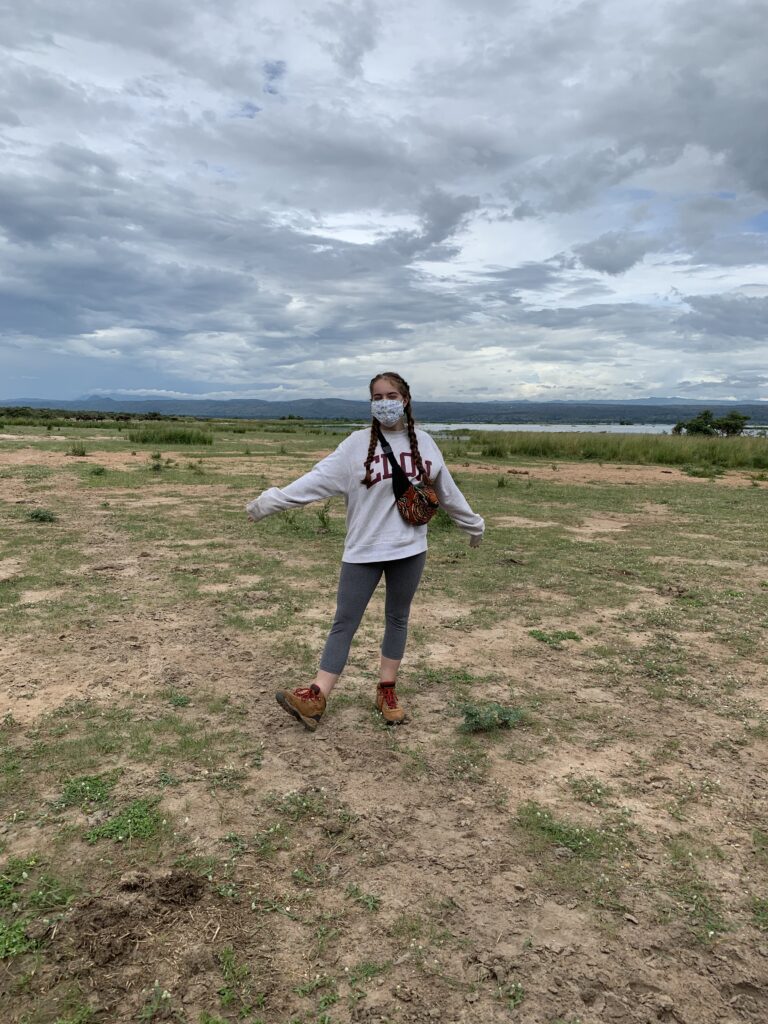
Aligning with her ongoing research at Elon University, Mary conducted research about locally led justice processes in Rwanda for her Independent Study Project (ISP) with SIT. These Gacaca courts, as they were called, played a primary role in bringing peace to the country after the genocide.
She was struck by the disparity between scholarly research written by mostly white, Western men about the failures of those local peace processes versus what she saw and heard from the people who went through it.
“Every person we talked to up to that point talked about how successful the justice program was, how it wasn’t a Western judicial process, but it was an African-style judicial process,” she said. “So, my research focused on the actual perspectives of people who went through the genocide and then the Gacaca courts.”
Mary met with both survivors and perpetrators of the genocide, as well as judges and community members, to ensure all voices were heard. At the end of almost every interview, each interviewee asked that their stories be shared to help correct misconceptions about Rwanda and emphasize how far they’ve come.
Mary said SIT took great measures to ensure that every student’s mental health was taken care of. To balance the heavy nature of the topics they discussed, they also had lighter experiences, such as making their own coffee from Rwandan coffee bean fields.
It was an experience that she described as “incredible,” and made for a true launching pad into the next phase of her academic and professional career. After graduating, she went looking for graduate programs that emphasized on-the-ground international experience and came across SIT’s global master’s in humanitarian assistance and crisis management.

She was enticed by the program’s travel to multiple countries, which was originally intended to be Jordan and Uganda. But after she was accepted, an Ebola outbreak hit Uganda forcing SIT to reshape the program. Mary saw this as a great example of how international practitioners often have to think on their feet and change course unexpectedly.
“Our professors emphasized that this was just a common element of crisis management and that we have to get used to not knowing things because when there’s a crisis, you won’t always know where you’re going,” she said. “It was almost like real-life practice for our future jobs.”
The program took Mary’s cohort to Jordan, Turkey, and Serbia, which allowed her to compare what she had just experienced in Rwanda with that in Bosnia and Herzegovina, also a post-genocide society.
The opportunities to be abroad and to meet people in the field, especially through SIT’s master’s programs, are genuinely preparing you for the job.
The curriculum included a semester where students could choose their own country. As a French speaker, Mary chose Morocco. While there, she worked full-time for a refugee organization in their grants department and assisted with workshops amongst African refugee service providers.
Concurrently, she completed her thesis, which reviewed Tanzanian and international organizations’ water and sanitation policies through a decolonized perspective and was later published.
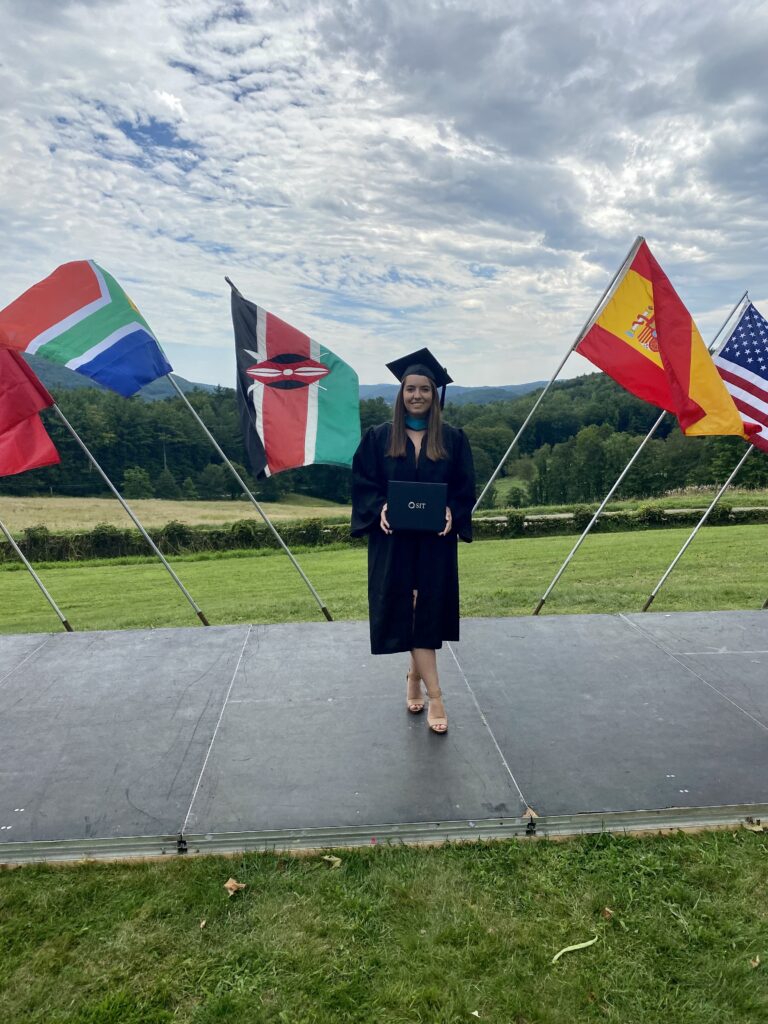
After graduating from the MA program in August 2023, she quickly began her current role as a program associate at the American Bar Association Rule of Law Initiative in the Africa division. There, she says every day is an opportunity to draw upon both of her study abroad experiences.
“The opportunities to be abroad and to meet people in the field, especially through SIT’s master’s programs, are genuinely preparing you for the job,” she said. “For example, at SIT, we had classes on writing proposals, and I have directly used that work when I’ve been working on proposals for my job. SIT just really prepares you for the actual work.”
Mary is also still in touch with her homestay family from Jordan and receives a text from her homestay neighbor almost every day.
As each of her programs shifted gears, Mary learned how to think and act on her feet and was equipped with the hard skills used in her everyday work, ultimately shaping her as a researcher, practitioner, and global citizen. “Study abroad prepared me to expect the unexpected,” she said. “I 100 percent recommend it to anyone who’s considering it.”
Registration now open for nearly 40 SIT summer programs
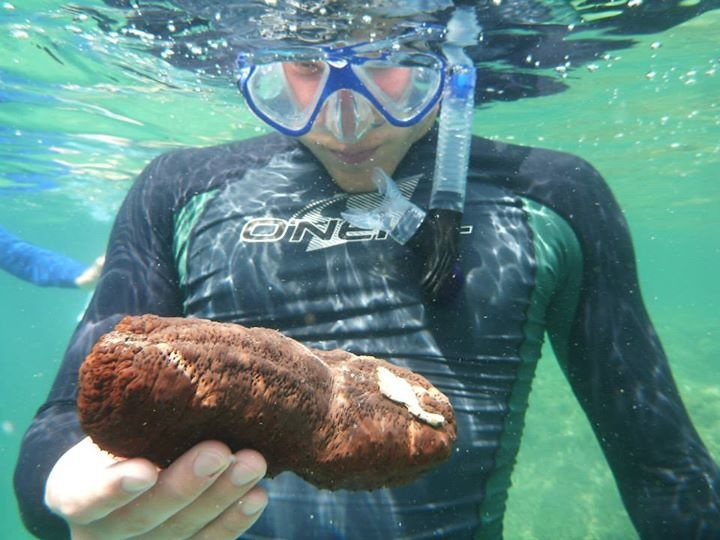
If you haven’t yet begun planning for next summer, this is a great time to start.
Registration opens Wednesday, Sept. 15, for 38 SIT summer 2022 study abroad opportunities. Included are new programs that encompass art and social change in Eastern Europe; hip-hop music and decoloniality in Senegal; climate change in Jordan; peace-building and human rights in the Balkans; human trafficking in the Netherlands; food security in Italy; epidemiology in Argentina; and urban design and social justice in Spain.
“SIT has historically expanded the frontiers of international education, creating global opportunities of learning and cultural immersion for thousands of students a year across all continents,” notes SIT Dean of Faculty Dr. Said Graiouid. “The summer 2022 portfolio maintains that tradition with programs that focus on social, political, economic and scientific arenas and in diverse historical periods and geographical settings.”
Students are challenged to embrace a human-centered, comparative approach …”
SIT’s immersive programs next summer will take place in sub-Saharan Africa, the Asia Pacific region, Europe, and the Middle East/North Africa.
SIT will also once again offer virtual internships that allow undergraduates to build invaluable professional and academic experience on a range of subjects. These include two Jordan internships, in counseling and humanitarian action, and in community empowerment and climate change; women’s rights in Cameroon; education and social change in Chile; sustainability in India; public health in Kenya; human rights in Serbia; diplomacy and international relations in South Africa; and development and gender in Vietnam.
Regardless of which program they choose, says Graiouid, “students are challenged to embrace a human-centered, comparative approach in which they engage with resources and the competencies needed for the development of the skills of critical literacy, intercultural communication, and intellectual polity.”
Alix Swann, an international studies major at Spelman College, did a virtual internship on the Chile program in fall 2020 in which she worked with a women’s collective that fights street sexual harassment. Alix’s task was to teach about U.S. laws and policies on sexual harassment in the workplace and digital sexual harassment.
“Before this internship, my viewpoint was solely from a U.S. perspective, and I now no longer try to relate everything to the U.S.,” she says.
Yardena Meyerhoff, a physics and astronomy major at Whitman College, also did the Chile program, interning with the Colegio de Profesoras y Profesores de Chile to conduct a comparative analysis of Chile’s standardized testing system and the effect of standardized testing on student learning and development.
“My meetings with my internship advisor were very organic and natural and would often go in fascinating and sometimes unexpected directions. Our conversations made me think about my own experiences with education growing up in Minnesota, and how education systems around the world suffer from similar inequalities,” Yardena recalls.
SIT’s virtual language programs have also been popular during the pandemic. Language options for summer 2022 include all levels of Arabic (from Jordan); Swahili (Kenya); Hindi (India); Nepali and Tibetan (Nepal).
New SIT programs for summer 2022 are:
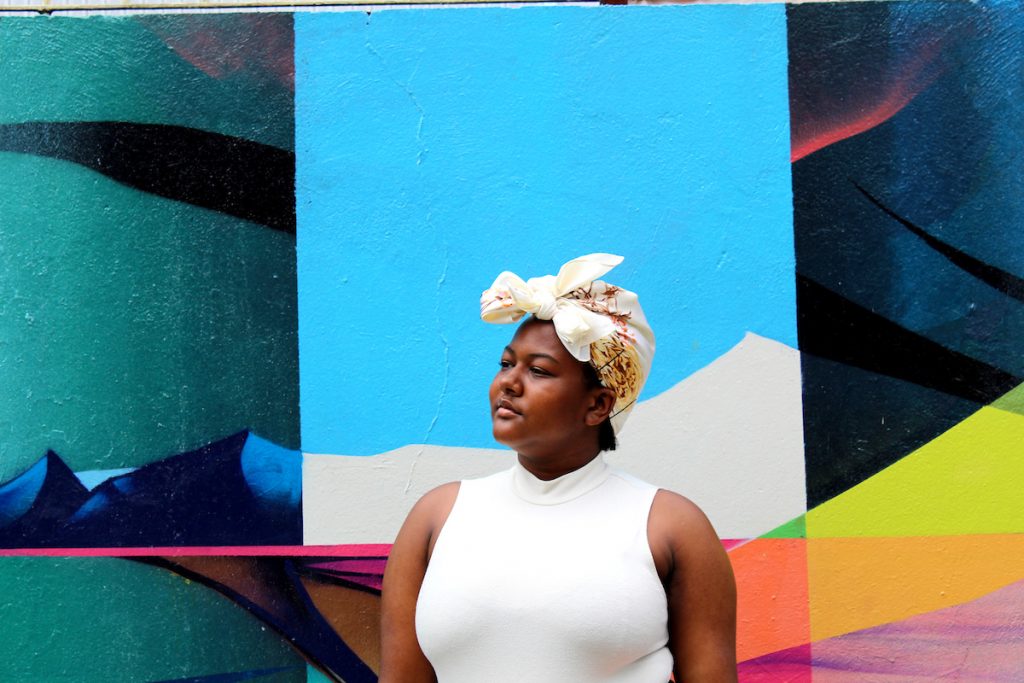
Argentina: Epidemiology and Healthcare Management—Through SIT’s close partnership with ISALUD, the nation’s top health university and think tank, examine urban epidemiology, health inequalities, and the challenges of managing health services and policies to expand access to healthcare.
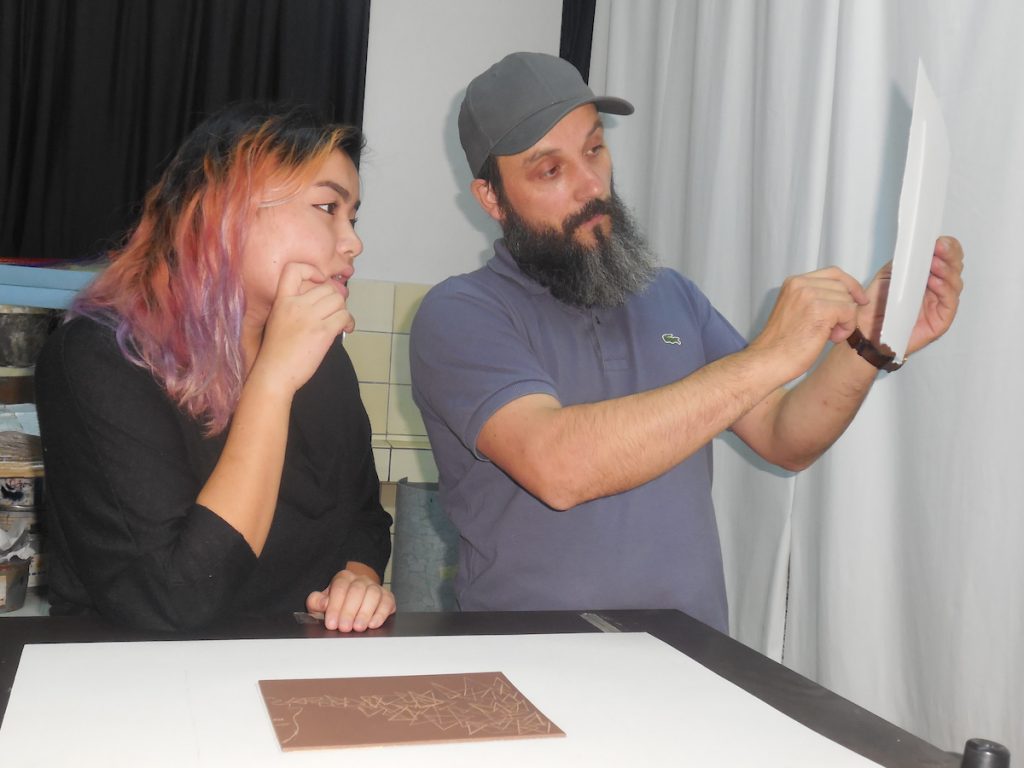
Czech Republic: Studio Arts—Explore photography, creative writing, or contemporary dance through an intensive arts workshop while examining debates around art, politics, and society.
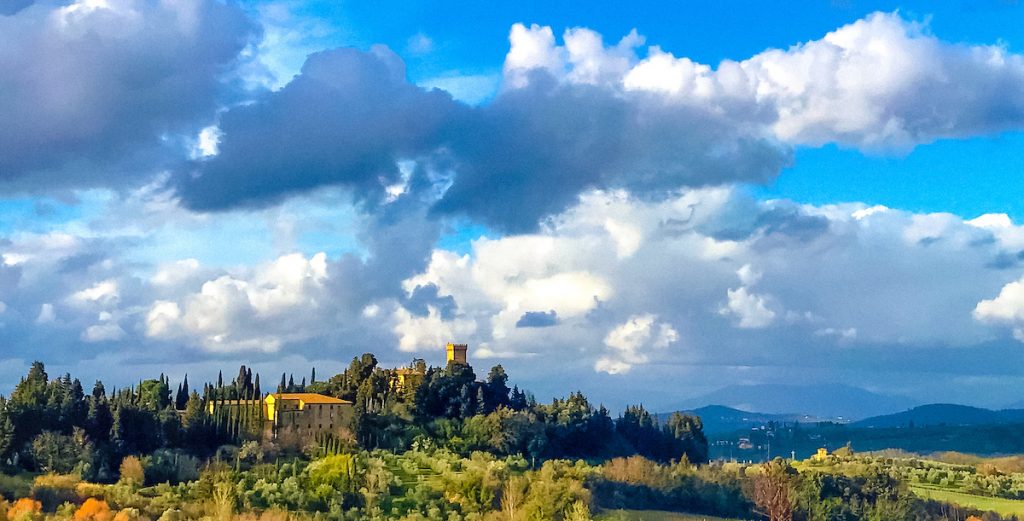
Italy: Food Security and Nutrition—Delve into sustainable agriculture on a Tuscan estate and explore how international experts are confronting challenges of food security, nutrition, and health.
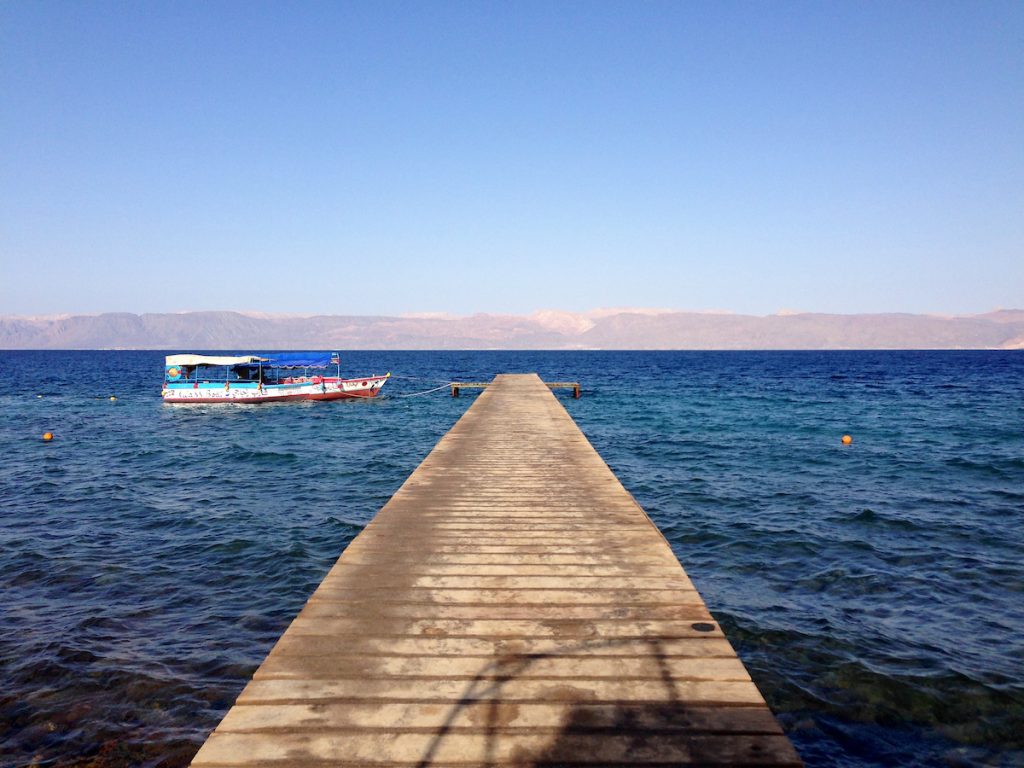
Jordan: Community Empowerment and Climate Change Internship—Gain professional experience with a UN or government agency or NGO working with youth and vulnerable groups on community empowerment and environmental sustainability.

Netherlands: Human Trafficking, Sex Trade, and Modern Slavery in Europe—Examine diverse areas of human trafficking and the sex trade, including the relationship between sex workers and broader societies.
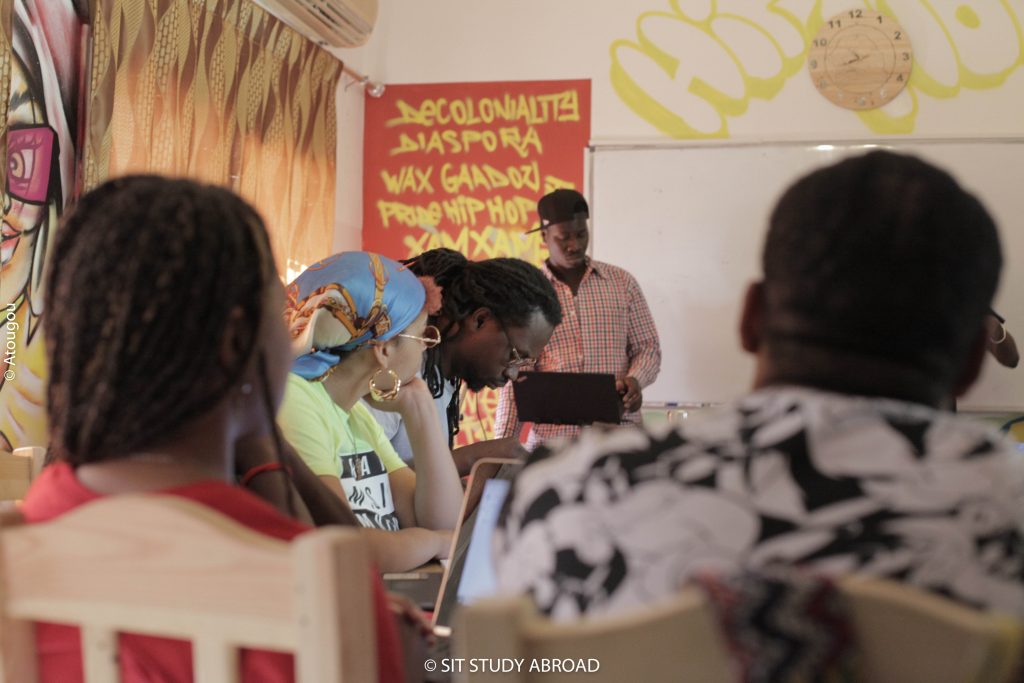
Senegal: Hip-Hop, Resilience, and Black Struggles—Examine how young Africans use hip-hop to question traditional representations of Africa, imagine the continent’s future, and raise consciousness of globalization and (in)equality.
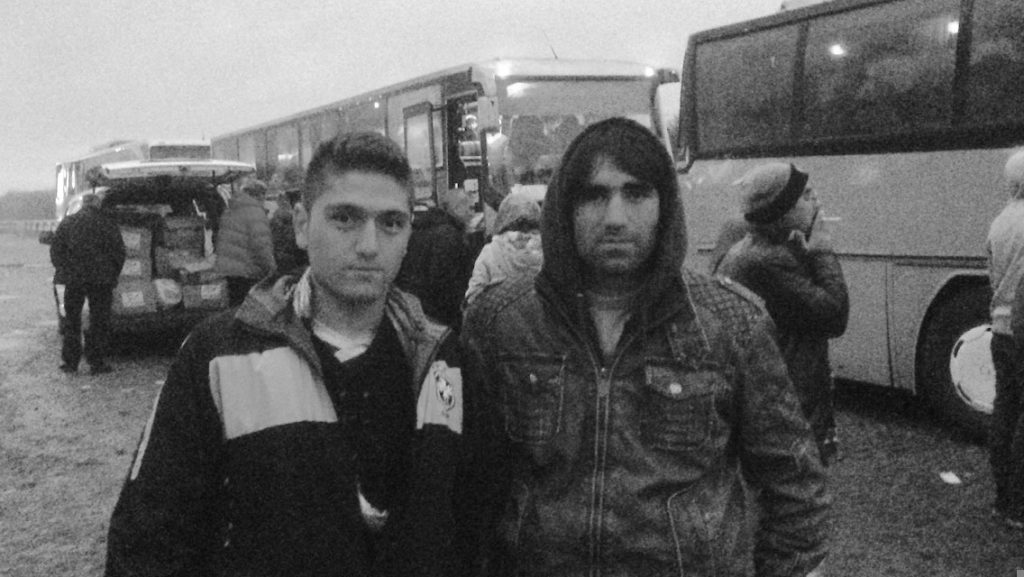
Serbia: Transitional Justice, Human Rights, and Memory Activism Internship—Look at justice, human rights, and memory in post-conflict societies and contribute to the work of an important organization with a meaningful internship.

Spain: Sustainable Urban Development and Social Justice—Explore the approaches Spanish cities are taking to pursue sustainable urban development within a social justice framework.
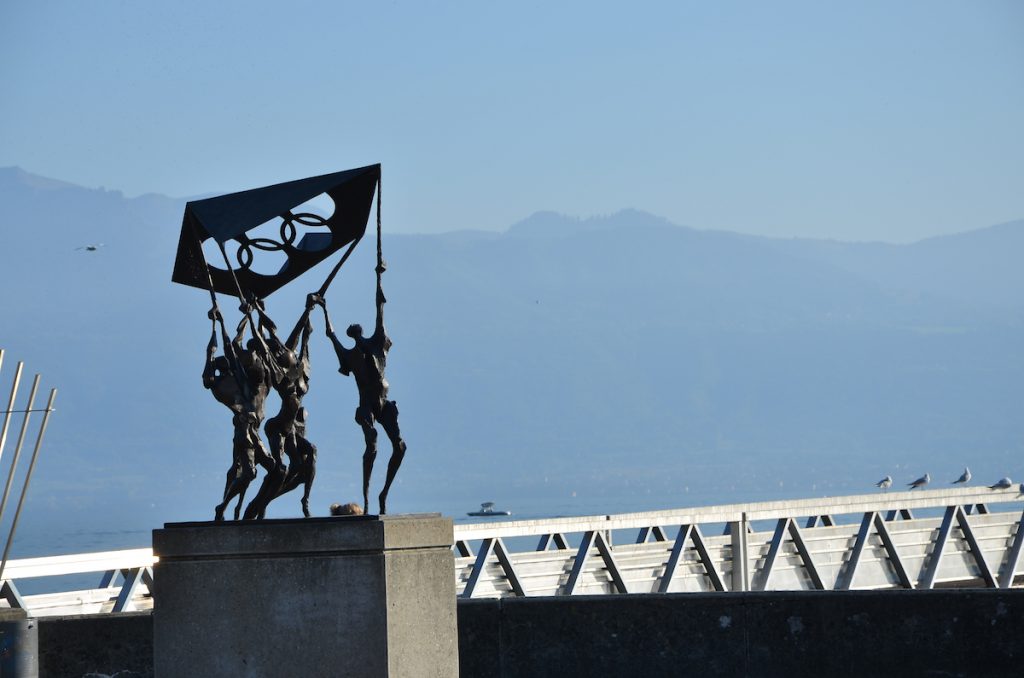
Switzerland: Global Health and Development Policy—Compare public health systems within the framework of international and sustainable development, humanitarian action, human rights, and social justice.
For more information about these and all SIT Study Abroad programs, visit www.studyabroad.sit.edu.
Ana was born and raised in Belgrade, where she completed bachelor’s and master’s degrees in English language and literature. She holds a master’s degree in English literature from the University of Belgrade on the Prophetic Writings of William Blake. She also holds Cambridge CELTA certificate and Delta diploma in foreign language teaching methodology, both obtained in the UK. Since graduating from her master’s studies in 2011, she has been teaching both Serbian to foreigners and English as a foreign language. Her professional interests include language teaching methodology, pragmatics of native and foreign language use, comparative literature, and language in film and theatre.
Dr. Orli Fridman holds a PhD in conflict analysis and resolution from the Carter School for Peace and Conflict Resolution at George Mason University. Her interdisciplinary research focuses on peace studies and memory studies with interest in comparative conflict studies. She writes extensively about memory politics and memory activism in Serbia and in the successor states of the former Yugoslavia. In her writing and teaching, she brings comparative knowledge, experience and expertise from the Balkans and the Middle East (with focus on the Israeli-Palestinian conflict).
Dr. Fridman has been involved in political education for more than 20 years. She was trained as a facilitator for groups in conflict, and facilitated group encounters for participants from Israel/Palestine, Cyprus, and the successor states of the former Yugoslavia. She teaches in the Politics Department at the Belgrade-based Faculty of Media and Communications (FMK), where she heads the Center for Comparative Conflict Studies (CFCCS).
See Dr. Fridman’s full list of publications
Courses Taught
- Peace and Conflict Studies in the Balkans
- Research Methods and Ethics
- Practitioner Inquiry
- Memory and Conflict: Remembering and Forgetting in Divided Societies
- Reflective Practice
- Professional Development
Select Publications
Fridman, O. (2024). Memory and protest in Belgrade: Remembering the 1990s in the mass demonstrations of 2023. Memory Studies, 17(5), 1023-1038. https://doi.org/10.1177/17506980241263931
Fridman, O. and Gensburger, S. Eds. (2023). The Covid-19 Pandemic: A New Memory Era? Remembrance, Commemoration, and Archiving in Crisis. Palgrave Macmillan Memory Studies. https://link.springer.com/book/9783031345968
Fridman, O. (2022). Memory Activism and Digital Practices after Conflict: Unwanted Memories. Amsterdam: Amsterdam University Press
Fridman, O. (2022). #Memoryactivism and Online Commemorations. In Y. Gutman and J. Wüstenberg (Eds.). Routledge Handbook of Memory Activism (in press).
Fridman, O. and Gensburger, S. (2022). Unlocked Memory: Did the Covid Pandemic Change Commemorations? in Y. Gutman and J. Wüstenberg (Eds.). Routledge Handbook of Memory Activism. (in press).
Fridman, O. and Ristić, K. (2020). Online Transnational Memory Activism and Commemoration: The Case of the White Armband Day. In J. Wüstenberg and A. Sierp (Eds.) Agency in Transnational Memory Politics (pp. 68-91). New York: Berghahn Book.
Fridman, O. (2020). Peace formation from below: The “mirëdita, dobardan!” festival as an alternative to everyday nationalism. Nations and Nationalism, 26, 447-460.
Fridman, O. (2020). Conflict, Memory, and Memory Activism: Dealing with Difficult Pasts. In O. Richmond and G. Visoka (Eds.). The Palgrave Encyclopedia of Peace and Conflict Studies. Palgrave Macmillan, Cham. https://doi.org/10.1007/978-3-030-11795-5_38-1
Fridman, O. (2018). Too Young to Remember Determined Not to Forget”: Memory Activists Engaging with Returning ICTY Convicts. International Criminal Justice Review 28(4).
Select Popular Work
Featured on Realms of Memory podcast episode 21: https://realmsofmemory.com/podcast/episode-21-memory-activism-in-serbia-remembering-the-wars-of-the-1990s/
New Books Network October 19, 2022. Podcast with Orli Fridman about her book Memory Activism and Digital Practices After Conflict: Unwanted Memories
Glisic, Iva. (Host). (2022). New Books in Eastern European Studies [Audio podcast]. New Books Network. https://newbooksnetwork.com/memory-activism-and-digital-practices-after-conflict
Fridman, O. (2019). “Hashtag Memory Activism as a Mnemonic Practice: Online Memory Activism and Commemoration,” Observing Memories: Magazine of the European Observatory on Memories.
Fridman, O. (2016). “Mirëdita Dobar Dan Festival in Belgrade: We Stuck our Foot in the Open Door,” The Balkan in Europe Policy Advisory Group (BiEPAG) Blog, June 2.
Fridman, O. (2015). “Remembering the Wars of the Balkans: Belgraders helping Refugees from the Middle East,” Local Talk/Siha Mekomit, September 9. [Hebrew]
Fridman, O. (2015). Commemorating the 20th anniversary of the Srebrenica Genocide: Memory Activism in Serbia” Haaretz, July 11. [Hebrew]
Fridman, O. (2015). “How Belgraders Remember the NATO Bombings,” Balkan Insight, March 30.
Select Presentations
Fridman, O. (July 1, 2022). Keynote lecture at the annual conference Witnessing, Memory, and Crisis, at the Amsterdam School for Heritage, Memory and Material Culture
Fridman, O. (July 5-9, 2021). Remembering Online: Alternative Commemorative Events in times of Corona [panel Convenor ‘Memory and Commemorations in Times of Corona’]. Memory Studies Association (MSA), Warsaw/online. https://msaconferencewarsaw.dryfta.com/
Current Research Interests
Memory and commemorations in times of Covid-19
Alternative commemorative events in a comparative perspective
Alternative Ceremonies as a Political Action: the case of the Joint Israeli-Palestinian Memory Day Ceremony & the Joint Nakba Day Ceremony
